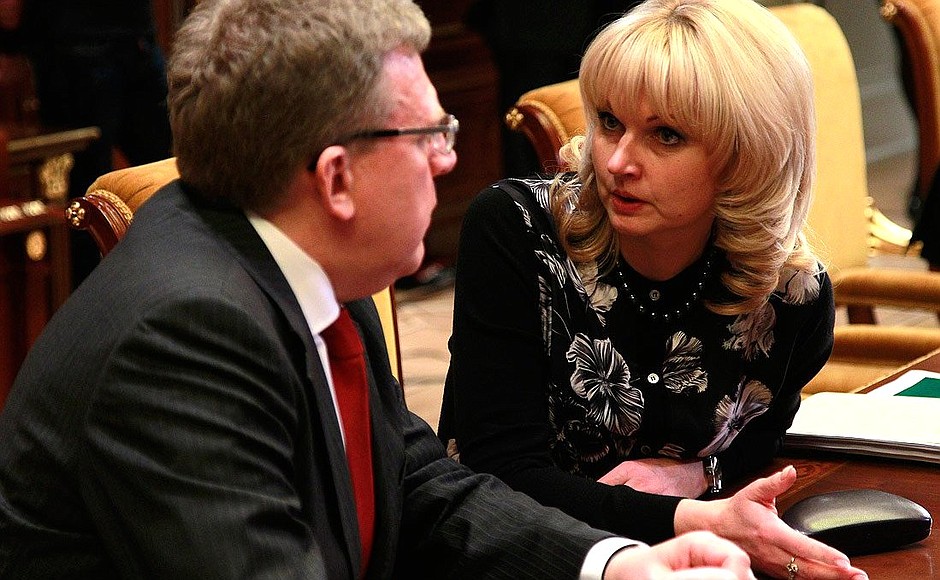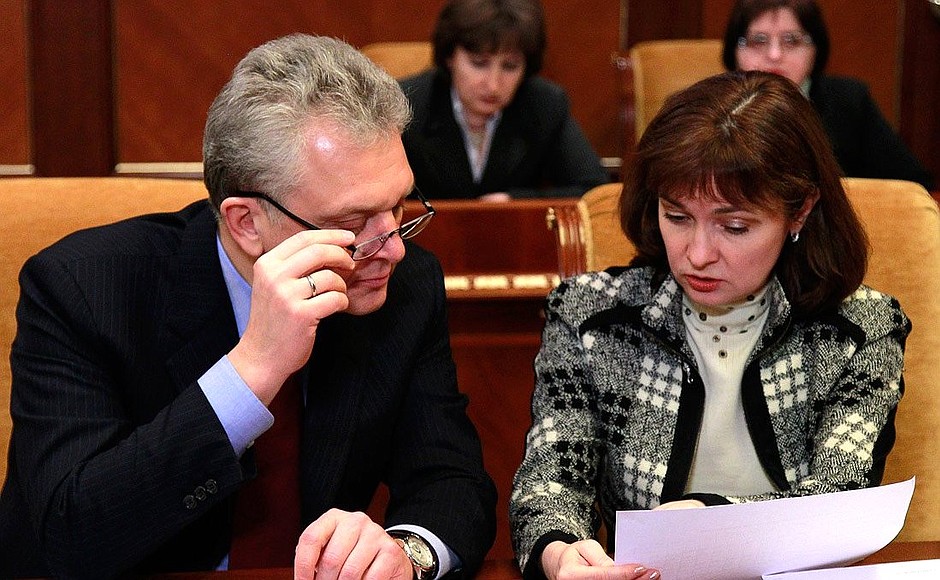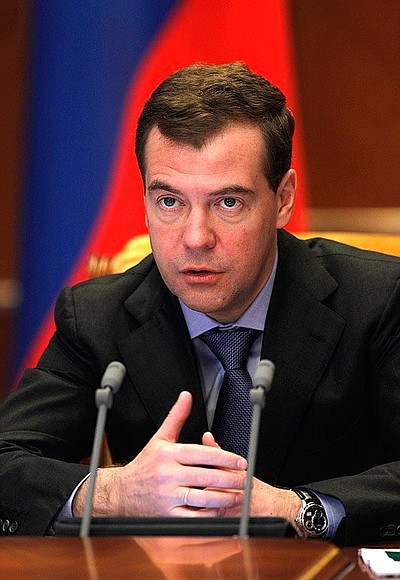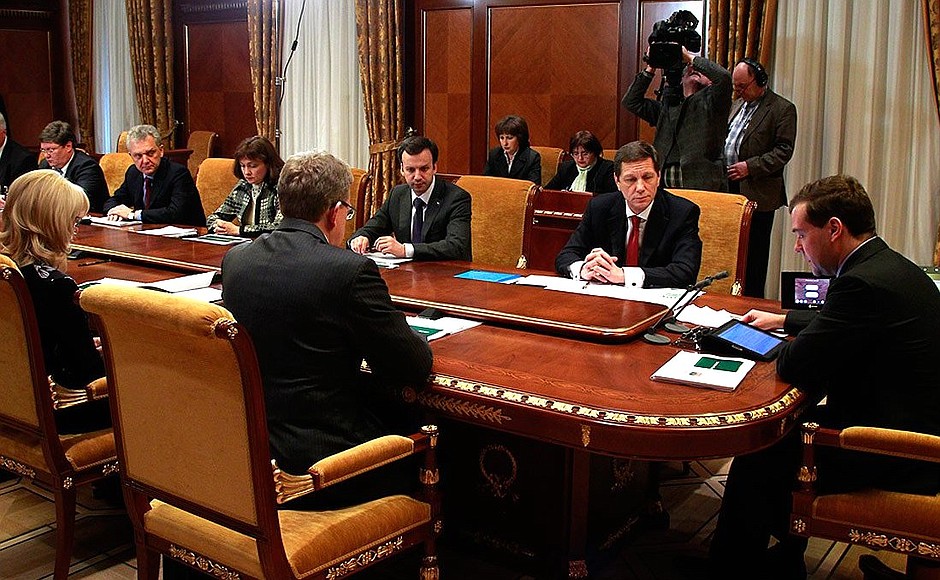This month Dmitry Medvedev plans to devote special attention to this issue.
President of Russia Dmitry Medvedev: Good afternoon, colleagues,
Last month we tackled the task of raising the prestige of the engineering profession in view of the role engineers play in Russia’s economic modernisation.
Today, our agenda focuses on improving labour conditions for workers. I intend to devote some time to this task in the near future, especially since this is one of the most important components of economic modernisation in our country, not to mention the fact that it directly affects a huge number of Russians.
The share of workers in the metals industry, natural resource production, construction, and at processing plants remains over 70%, although their share in the total labour force is about 17.5%. At advanced companies workers handle very complex systems, including electronic equipment and machinery. Over time, the technological modernisation of our economy will demand more skilled workers, which some members of our business community have already realised.
According to the Federal Service for State Statistics, as of January 1, 2011, workers accounted for 71% of all vacancies declared by employers, which means that more than two-thirds of our economy’s needs are met by workers. Take note: the economy needs workers.
”Improving labour conditions for workers is one of the most important components of economic modernisation in our country.“
As in the past, there is still a shortage of qualified turners, milling machine operators and other skilled workers, and employers have long been offering good salaries for these jobs. Nevertheless, there is a shortage of skilled workers. The reasons for that are clear: the difficult period in the 1990s, which saw a gap in the generations of workers, was a time when workers’ labour became devalued; there were massive job cuts and the prestige of workers fell sharply along with the standard of living, which was clear evidence that the workers’ professions became highly unpopular. Many traditions were lost, and setting the ideology aside, some of these traditions were highly useful, such as mentoring.
Times have changed, yet young people are not attracted to workers’ professions and the labour market offers do not meet the expectations of young professionals. Some of these young people, and according to the data I have, it is about 20% of young people in the most active age group, 20–25 years old, prefer to register as unemployed instead of getting jobs. This is a very alarming symptom. As a result, the average age of workers is 40 or even 50. The workforce is aging.
Moreover, and this is also a fact we must pay attention to because it may be interpreted differently but it reflects the overall trend: there is a large number of migrants among workers. This also indicates the prestige level of workers’ professions, and the existing allocation of priorities regarding the prestige of various professions.
We need to fully analyse the situation. Let us deal with it the way we did with issues pertaining to other population groups. I propose that we devote approximately a month to these matters.
The level of wages has paramount importance. Last year, the average workers’ wage was about 17,000 rubles ($600), which is 2,000 rubles more than in 2009. The tariff part of the wage ranges from 71% in construction industry to 60% in the mining industries. These sectors have a relatively high guaranteed pay level. In general, however, the benchmark for remuneration agreements in different industries is the subsistence minimum, whereas allowances, compensations, bonuses and health insurances are generally the responsibility of employers.
”In all civilised countries social partnership is considered to be the most effective mechanism for improving workers’ social status. It is clearly imperative to stimulate employers to live up to their social responsibility.“
Analysis shows that collective labour contracts and agreements generally comply with the Labour Code. That is, they do not extend beyond the Labour Code in cases when the norm prescribed in the Labour Code is, as lawyers say, dispositive and makes it possible to negotiate different terms while the level of social guarantees and benefits remains minimal. Although 92% of workers have such employment contracts, in reality they remain a pure formality. We must not turn a blind eye to it.
Dialogue between employees and employers is almost always unequal, despite the fact that in all civilised countries social partnership is considered to be the most effective mechanism for improving workers’ social status, and this applies to other professions too. It is clearly imperative to stimulate employers to live up to their social responsibility. I would like to hear your suggestions in this regard. Representatives of trade unions and relevant employers’ trade union, the Russian Union of Industrialists and Entrepreneurs, and others are present here today.
The second issue is related to workers’ training, which is crucial. It is directly linked with increasing the attractiveness of workers’ professions and improved living standards. We have been tackling this issue for a long time; I dealt with it as a member of the Government when we took measures to improve vocational training. Needless to say, our country urgently needs professionals who can work in high-tech industries, including those who can operate complex modern production equipment.
Despite the shortage of skilled workers, today only 15% of secondary vocational school graduates go on to work in their professions. There is no market demand for their occupations, and the jobs on offer often have no prospects whatsoever. In both cases, there is a misalignment between the education system on the one hand, and production sectors, i.e. the employers, on the other.
We must stop training workers for the industries that are becoming outdated. All we are doing is condemning young workers to changing jobs. Such vocational schools must change their curriculum, and these industries must go through all the standard steps that are accepted in the modern economy. Young people who enrol in colleges and secondary technical schools must clearly understand what lies in store for them in the future. This is not only a prerequisite for students at universities; those who are enrolled in secondary vocational schools must also understand exactly what their professional lives will be like.
As far as I know, our country has more than 2,500 institutions of basic vocational education and about the same number of secondary vocational schools, or community colleges, which have more than 2 million students – this is a huge figure, and a large number of educational institutions. This network must be rationalised and optimised. We have already done a few things: some vocational schools, the majority of them, in fact, have been turned for overseeing to the regions, but the regions must also decide how to run them.
”Our overall objective is to affirm the value in society of modern workers’ professions.“
Finally, one more issue: our overall objective is to affirm the value in society of modern workers’ professions. The regions, municipalities and the business community must actively join in this effort.
Another important goal is to improve labour conditions. According to the Federal Service for Labour and Employment, three-quarters of the total number of violations that occur in the workplace are violations of occupational health and safety legislation. 75% of all violations relate to occupational health and safety. Unfortunately, the number of such violations has remained practically unchanged over the past three years. At present, more than 25% of workers spend their days in conditions that do not meet sanitary standards. This is a deplorable figure for our country, which considers itself a dynamically developing and modern state.
The number of occupational diseases is also growing, and, regretfully, there is a rise in deaths resulting from accidents in the workplace, which is simply unacceptable. About 8,000 people have become disabled. Another tragic statistics: 537 people were killed at processing plants last year, 279 people at mining enterprises and 82 people at metals enterprises. Do any of you know what year it is? Let me remind you, it’s 2011, and not the period of primitive accumulation of capital.
Admittedly, many accidents take place as a direct result of the low level of working culture and production discipline; there is often a problem with employees’ behaviour in the workplace, that is clear. But this behaviour depends on the employers.
I think it is vital to speed up the introduction of a modern system of professional risk management. But, of course, all these topics will require careful consideration, and we must think it through. It should have a legislative basis and cover all workplaces, regardless of the company’s size or form of ownership. We must create mechanisms and economic incentives for employers to improve labour conditions. This is absolutely imperative, particularly through a possible differentiation of insurance premiums.
Colleagues, I have outlined some of the issues that we will consider today and in the near future. I think all of you understand that we are talking about the future of our economy and the future of a huge number of people.
<…>



